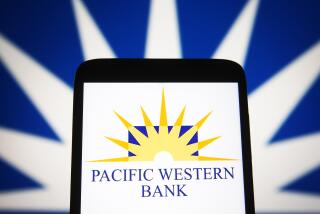Pacific Exchange, CBOE in Merger Talks
- Share via
In another sign of the rapid pace of consolidation among U.S. securities markets, the Pacific Exchange and the Chicago Board Options Exchange said Monday that they are talking about a deal.
The news immediately raised questions about the future of the Pacific’s downtown Los Angeles trading floor, which competes with the exchange’s main trading center in San Francisco.
The CBOE and the Pacific--respectively the most active and third-most active U.S. exchanges for the booming stock options business--said they are in “preliminary discussions about potential strategic alliances.” They declined to comment further.
The report followed a story on the CBS MarketWatch Internet site Friday that said the two exchanges were in talks.
Although it is far from certain that the CBOE and Pacific will agree to an outright merger--or even some sort of looser alliance--many analysts had expected both markets to look for partners in the wake of the Nasdaq Stock Market’s recent decision to buy the American Stock Exchange, the No. 2 options market.
Another options market, the Philadelphia Stock Exchange, also recently agreed to merge with Nasdaq, after rejecting a takeover offer from the CBOE.
Faced with the need to invest heavily in new technology and to reduce trading costs for ever more powerful institutional investors, U.S. securities markets are in a rush to merge or strike strategic alliances to gain critical mass.
The movement is mirrored overseas: The main London and Frankfurt stock exchanges last week announced an alliance. And on Monday, New York Stock Exchange Chairman Richard Grasso said the NYSE is in talks with unidentified potential partners.
The Pacific, which has long prided itself on its independence and relative financial strength among regional stock exchanges, runs its primary trading operation in San Francisco, where all of its options business is transacted.
Trading in put and call options--contracts that allow investors to either speculate on stock price movements or hedge against such movements--has been the Pacific’s major growth business in recent years. The Pacific traded 46.7 million options contracts in 1997, up 185% from the 1993 total.
In contrast, the Pacific traded 3.3 billion shares of stock last year, up just 43% from 1993.
The Pacific’s stock trading is split about 50-50 between San Francisco and Los Angeles.
Analysts cautioned that the CBOE and Pacific might not be able to hammer out a deal, in part because the San Francisco trading community is likely to balk at any terms that would shift business to the larger CBOE floor in Chicago.
Indeed, the Pacific has proposed building a new, $150-million trading facility in downtown San Francisco to house its operations. The Pacific’s San Francisco staff totals nearly 400 people.
But the future of the Pacific’s smaller stock-trading operation--and in particular, the 12-year-old Los Angeles trading floor, which has a staff of about 100--is a bigger question mark. The Pacific’s lease on its Los Angeles building expires in 2000.
Regional stock exchanges have existed to offer investors an alternative to the NYSE and Nasdaq, but the NYSE has been clawing back market share in recent years. The Pacific’s share of total volume in NYSE-listed stocks fell to 1.9% last year. It was 3% in 1992.
To bolster its equity business, the Pacific this fall will be the first exchange to offer a new all-electronic trading system devised by OptiMark Technologies. The system is designed to allow big investors to trade directly with one another, via the Pacific. However, OptiMark’s success is far from assured.
More to Read
Inside the business of entertainment
The Wide Shot brings you news, analysis and insights on everything from streaming wars to production — and what it all means for the future.
You may occasionally receive promotional content from the Los Angeles Times.










